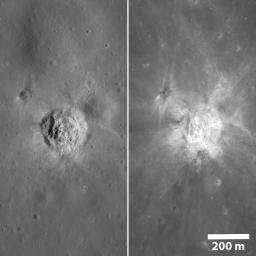
|
Illumination Comparison of a Mare Crater
- Click the image above for a larger view
- Full-Res JPEG (1000 x 1000) (90.6 kB)
- Full-Res TIFF (1000 x 1000) (1.0 MB)
Caption:
The same crater from two LROC NAC frames under very different lighting. On the left the Sun was midway to the horizon and on the right the Sun was high, approaching noon. Under lower Sun, surface roughness is quite evident; under higher sun (right) variations in brightness (reflectance) dominate the scene.
Background Info:
NASA's Goddard Space Flight Center built and manages the mission for the Exploration Systems Mission Directorate at NASA Headquarters in Washington. The Lunar Reconnaissance Orbiter Camera was designed to acquire data for landing site certification and to conduct polar illumination studies and global mapping. Operated by Arizona State University, the LROC facility is part of the School of Earth and Space Exploration (SESE). LROC consists of a pair of narrow-angle cameras (NAC) and a single wide-angle camera (WAC). The mission is expected to return over 70 terabytes of image data.
Cataloging Keywords:
| Name | Value | Additional Values |
|---|---|---|
| Target | Moon | |
| System | Earth | |
| Target Type | Satellite | |
| Mission | Lunar Reconnaissance Orbiter (LRO) | |
| Instrument Host | Lunar Reconnaissance Orbiter | |
| Host Type | Orbiter | |
| Instrument | Lunar Reconnaissance Orbiter Camera (NAC) | |
| Detector | Narrow Angle Camera (NAC), Wide Angle Camera (WAC) | |
| Extra Keywords | Crater, Grayscale | |
| Acquisition Date | ||
| Release Date | 2009-10-20 | |
| Date in Caption | ||
| Image Credit | NASA/GSFC/Arizona State University | |
| Source | photojournal.jpl.nasa.gov/catalog/PIA12916 | |
| Identifier | PIA12916 | |
